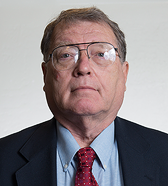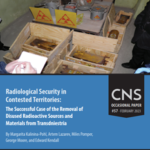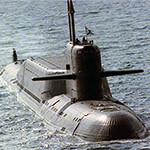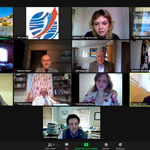 Scientist-in-Residence,
Scientist-in-Residence,
Adjunct Professor
[email protected]
Office: McGowan 208C
Monterey, CA
831-647-4613
Areas of Research
- Nuclear weapons
- Illicit trafficking
- Nuclear Security
- Binding and Non-Binding Legal Instruments for Nuclear Security
- Aviation Security Issues
Background
From 2007-2012, Dr. George M. Moore was a Senior Analyst in the Office of Nuclear Security at the International Atomic Energy Agency (IAEA) in Vienna, Austria. At IAEA, he worked with the Illicit Trafficking Database (ITDB) and served as Scientific Secretary for the Director General’s Advisory Group on Nuclear Security (AdSec). He also served as Scientific Secretary for the development of the Agency’s Fundamentals of Nuclear Security document, the top-level document in the Agency’s Nuclear Security Series that will be published in fall 2012.
He is a former Fulbright Scholar (Netherlands) and a former Atomic Energy Commission (AEC) Special Fellow. He is a licensed Professional Engineer (Nuclear) in California and was formerly an AEC-licensed research reactor operator. He is admitted to practice before the U.S. Supreme Court and in a number of Federal Circuit and District Courts across the United States.
After graduation from Annapolis, Dr. Moore served as a naval officer until he resigned from the Navy as a lieutenant commander. He then worked at Lawrence Livermore National Laboratory (LLNL) in various assignments in areas relating to nuclear physics, nuclear effects, and radiation detection and measurement. He left LLNL and served as an in-house counsel at Northern California’s utility company, Pacific Gas & Electric, until he entered private practice with the San Francisco firm of Kenney & Markowitz where he specialized in litigation in the areas of aviation, recreational boating, product liability, intellectual property, and commercial law. Dr. Moore left Kenney & Markowitz in 2002 to return to LLNL where he worked in the Nuclear Assessment (NAP) program. He left LLNL in mid-2007 to join the IAEA.
Dr. Moore currently serves as an aviation legal expert for Plane & Pilot magazine. He holds a commercial pilot’s license (single engine land and sea) with an instrument rating.
Throughout his career, Dr. Moore has authored a number of technical papers and legal articles and has been a speaker at various meetings and training activities. He has been a member of a number of professional organizations and has often served as an officer in the organizations. He has been an adjunct faculty member at Golden Gate University School of Law where he taught Aviation Law, and he was also an adjunct faculty member of Golden Gate’s management program where he taught statistics and quantitative analysis for business decision making. He is a retired Captain, U. S. Naval Reserve.
Education
Dr. Moore received a Bachelor’s degree from the U.S. Naval Academy and a Masters and Ph.D. in Nuclear Engineering from the University of California, Berkeley. He also holds a Juris Doctor (JD) degree from the University of California’s Boalt Hall (Berkeley) School of Law and is a member of the California and Colorado bars.
CNS Work
- The IAEA’s “Significant Quantity:” What It Is and What It Isn’t
 The IAEA’s Significant Quantity (SQ) is a politically sensitive, approximate amount of nuclear material used as a baseline for determining inspection goals and frequency under the NPT, despite being often misunderstood as the minimum required for a weapon.
The IAEA’s Significant Quantity (SQ) is a politically sensitive, approximate amount of nuclear material used as a baseline for determining inspection goals and frequency under the NPT, despite being often misunderstood as the minimum required for a weapon. - Why nuclear-powered commercial ships are a bad idea
 Nuclear-powered cargo ships are a particularly bad idea in an era of international terrorism and piracy.
Nuclear-powered cargo ships are a particularly bad idea in an era of international terrorism and piracy. - Charting a roadmap for multiparty confidence and security building measures, risk reduction, and arms control in the Indo-Pacific
 This work contains contributions by CNS’s Miles Pomper, Allison Berke, Ferenc Dalnoki-Veress, and George M. Moore.
This work contains contributions by CNS’s Miles Pomper, Allison Berke, Ferenc Dalnoki-Veress, and George M. Moore. - Putin’s War with Ukraine: Voices of CNS Experts on the Russian Invasion
 A compendium of CNS expert analysis and commentary on the nuclear ramifications of the war, as well as educational materials for expert and general audience.
A compendium of CNS expert analysis and commentary on the nuclear ramifications of the war, as well as educational materials for expert and general audience. - OP#57: Radiological Security in Contested Territories
 One of the few success stories in the elimination of radioactive sources from a contested territory is the Republic of Moldova’s removal of approximately 2,700 disused radioactive materials from the breakaway region of Transdniestria.
One of the few success stories in the elimination of radioactive sources from a contested territory is the Republic of Moldova’s removal of approximately 2,700 disused radioactive materials from the breakaway region of Transdniestria. - Why the world must protect nuclear reactors from military attacks. Now.
 While Russia’s actions at the Zaporizhzhia nuclear power plant have received condemnation, its attacks on reactors and nuclear facilities may not be illegal given the fact that no international agreement specifically addresses the issue.
While Russia’s actions at the Zaporizhzhia nuclear power plant have received condemnation, its attacks on reactors and nuclear facilities may not be illegal given the fact that no international agreement specifically addresses the issue. - WMD Terrorism Threats: Assessing and Prosecuting
 Eighteen senior and mid-level government employees from Malaysia and the Philippines traveled to CNS for a two-week in-person workshop.
Eighteen senior and mid-level government employees from Malaysia and the Philippines traveled to CNS for a two-week in-person workshop. - How international law applies to attacks on nuclear and associated facilities in Ukraine
 The postwar international system will need to consider stronger legal measures and consider how to enforce such measures.
The postwar international system will need to consider stronger legal measures and consider how to enforce such measures. - Nuclear Subs in Australia Will Challenge the Nonproliferation Regime, and China
 Acquiring a U.S. or UK submarine, possibly with a joint crew, could be a big first step forward for an Australian nuclear submarine program.
Acquiring a U.S. or UK submarine, possibly with a joint crew, could be a big first step forward for an Australian nuclear submarine program. - Masters Students in Dual Degree Program Defend Theses
 Students from Russia, the United States and South Korea presented their final papers as the result of their studies in 2019-2021.
Students from Russia, the United States and South Korea presented their final papers as the result of their studies in 2019-2021.
